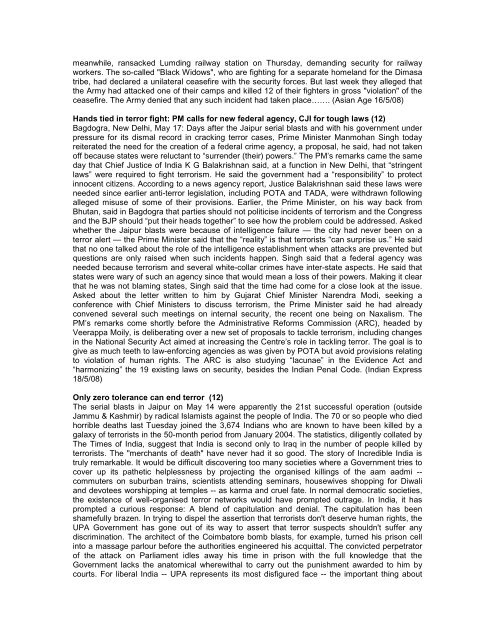TERRORISM - 2008 - Indian Social Institute
TERRORISM - 2008 - Indian Social Institute
TERRORISM - 2008 - Indian Social Institute
You also want an ePaper? Increase the reach of your titles
YUMPU automatically turns print PDFs into web optimized ePapers that Google loves.
meanwhile, ransacked Lumding railway station on Thursday, demanding security for railway<br />
workers. The so-called "Black Widows", who are fighting for a separate homeland for the Dimasa<br />
tribe, had declared a unilateral ceasefire with the security forces. But last week they alleged that<br />
the Army had attacked one of their camps and killed 12 of their fighters in gross "violation" of the<br />
ceasefire. The Army denied that any such incident had taken place……. (Asian Age 16/5/08)<br />
Hands tied in terror fight: PM calls for new federal agency, CJI for tough laws (12)<br />
Bagdogra, New Delhi, May 17: Days after the Jaipur serial blasts and with his government under<br />
pressure for its dismal record in cracking terror cases, Prime Minister Manmohan Singh today<br />
reiterated the need for the creation of a federal crime agency, a proposal, he said, had not taken<br />
off because states were reluctant to “surrender (their) powers.” The PM’s remarks came the same<br />
day that Chief Justice of India K G Balakrishnan said, at a function in New Delhi, that “stringent<br />
laws” were required to fight terrorism. He said the government had a “responsibility” to protect<br />
innocent citizens. According to a news agency report, Justice Balakrishnan said these laws were<br />
needed since earlier anti-terror legislation, including POTA and TADA, were withdrawn following<br />
alleged misuse of some of their provisions. Earlier, the Prime Minister, on his way back from<br />
Bhutan, said in Bagdogra that parties should not politicise incidents of terrorism and the Congress<br />
and the BJP should “put their heads together” to see how the problem could be addressed. Asked<br />
whether the Jaipur blasts were because of intelligence failure — the city had never been on a<br />
terror alert — the Prime Minister said that the “reality” is that terrorists “can surprise us.” He said<br />
that no one talked about the role of the intelligence establishment when attacks are prevented but<br />
questions are only raised when such incidents happen. Singh said that a federal agency was<br />
needed because terrorism and several white-collar crimes have inter-state aspects. He said that<br />
states were wary of such an agency since that would mean a loss of their powers. Making it clear<br />
that he was not blaming states, Singh said that the time had come for a close look at the issue.<br />
Asked about the letter written to him by Gujarat Chief Minister Narendra Modi, seeking a<br />
conference with Chief Ministers to discuss terrorism, the Prime Minister said he had already<br />
convened several such meetings on internal security, the recent one being on Naxalism. The<br />
PM’s remarks come shortly before the Administrative Reforms Commission (ARC), headed by<br />
Veerappa Moily, is deliberating over a new set of proposals to tackle terrorism, including changes<br />
in the National Security Act aimed at increasing the Centre’s role in tackling terror. The goal is to<br />
give as much teeth to law-enforcing agencies as was given by POTA but avoid provisions relating<br />
to violation of human rights. The ARC is also studying “lacunae” in the Evidence Act and<br />
“harmonizing” the 19 existing laws on security, besides the <strong>Indian</strong> Penal Code. (<strong>Indian</strong> Express<br />
18/5/08)<br />
Only zero tolerance can end terror (12)<br />
The serial blasts in Jaipur on May 14 were apparently the 21st successful operation (outside<br />
Jammu & Kashmir) by radical Islamists against the people of India. The 70 or so people who died<br />
horrible deaths last Tuesday joined the 3,674 <strong>Indian</strong>s who are known to have been killed by a<br />
galaxy of terrorists in the 50-month period from January 2004. The statistics, diligently collated by<br />
The Times of India, suggest that India is second only to Iraq in the number of people killed by<br />
terrorists. The "merchants of death" have never had it so good. The story of Incredible India is<br />
truly remarkable. It would be difficult discovering too many societies where a Government tries to<br />
cover up its pathetic helplessness by projecting the organised killings of the aam aadmi --<br />
commuters on suburban trains, scientists attending seminars, housewives shopping for Diwali<br />
and devotees worshipping at temples -- as karma and cruel fate. In normal democratic societies,<br />
the existence of well-organised terror networks would have prompted outrage. In India, it has<br />
prompted a curious response: A blend of capitulation and denial. The capitulation has been<br />
shamefully brazen. In trying to dispel the assertion that terrorists don't deserve human rights, the<br />
UPA Government has gone out of its way to assert that terror suspects shouldn't suffer any<br />
discrimination. The architect of the Coimbatore bomb blasts, for example, turned his prison cell<br />
into a massage parlour before the authorities engineered his acquittal. The convicted perpetrator<br />
of the attack on Parliament idles away his time in prison with the full knowledge that the<br />
Government lacks the anatomical wherewithal to carry out the punishment awarded to him by<br />
courts. For liberal India -- UPA represents its most disfigured face -- the important thing about

















